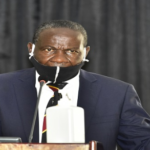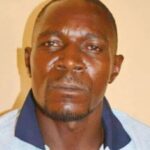The top management team at the Civil Aviation Authority (CAA) is on the spot for hastily sanctioning a Shs10 billion project to expand the passenger terminal at Entebbe Airport, even when the Board had frozen the construction projects.
According to the chairperson of Parliament’s Committee on Commissions, Statutory Authorities, and State Enterprises (Cosase), Mr Joel Ssenyonyi, his committee is now examining circumstances under which the contract for what is also known as the Karibuni Lounge was awarded.
“We have received several whistleblowers’ reports around the various projects implemented under the expansion of the airport. The contract around the Karibuni Lounge is one of the items under investigation,” Mr Ssenyonyi said on Thursday.

Defying the Board
We’ve learnt that the management of CAA tabled a proposal to expand the passenger terminal to ease congestion in the transit and departure lounges.
But the CAA’s former Board headed by Mr Edward Mike Ndawula vetoed it, saying it was a waste of resources at a time when CAA’s earnings had dipped following travel restrictions that came into force with the global outbreak of Covid-19 pandemic.
Copies of three different sets of minutes of meetings of the Board, including those of the last one held on May 14, only three days before its term ended, indicate that the project was considered “non-priority.”
The minutes also revealed that the Board had also blocked execution of all projects until after solutions to mitigate the effects of Covid-19 were put in place.
“No new projects should be implemented in the period in order to save resources to cater for the staff since our revenues have been greatly affected by the suspension of commercial passenger flights,” read one of the minutes of the meeting of May 14.
The Board was also concerned that no risk assessment and stakeholder engagements had been carried out.
However, Mr Vianney Luggya, the public affairs manager at CAA, told Sunday Monitor in a previous interview that two different consultancy firms had carried out structural integrity reports on the building and given it a clean bill of health.
“Teclab Ltd and Ssentoogo and Partners did studies and all the two reports conclude a satisfactory structural integrity of the building,” Mr Luggya said.
One of the other reasons why Mr Ndawula’s Board vetoed the project was that it would block the air traffic controller’s line of sight and render part of the runaway unserviceable. But Mr Luggya insisted that neither the operations of both the control tower nor the runaway would be affected by the project.
We’ve further learnt the tender for the Karibuni project was awarded to Sayani Brothers as soon as the term of office of the Ndawula Board expired and before a new one could take office.
The Ndawula Board’s term of office ended on May 17, 2020. A new board led by former Deputy Chief Justice Steven Kavuma was named on June 3. It assumed office on June 24.
Query
The question now is why the management exploited the Board’s transition window and not wait for a new Board to be constituted before proceeding with a project that the previous board had put on hold.
Mr Luggya could not explain how a matter that had been vetoed by the Board ended up being executed. But he claims the project was approved, although he was non-specific and could not say who had approved the project, neither could he avail Sunday Monitor the relevant minute or documents to back his claims.
He simply said: “This matter (was) exhaustively discussed and considered and was agreed to be progressed.”
Questions have also been raised about the manner in which the contract for the Shs10b project was awarded. A whistleblower has since written to Cosase, alleging a breach of procurement rules.
But Mr Luggya said the award was subjected to a competitive bidding process. “The project was tendered and a number of companies competed. However, Seyani Brothers came out as the lowest economic best evaluated bidder at a cost of Shs10.5 billion,” Mr Luggya said.
He also defended the expansion, saying it will create more space in the departure lounges, which he said often used to get congested during peak hours. Mr Luggya added that it was also intended to accommodate physical and social distancing regulations prescribed by the World Health Organisation and the International Civil Aviation Organisation (ICAO) for departure, waiting and boarding areas at airports.
A member of Cosase told Sunday Monitor that the committee is also investigating allegations of corruption, abuse of funds and inflation of costs of civil works in the implementation of projects at the airport.
“Some key components of the project such as the freighters house to operationalise the cargo centre were intentionally left out in order to be handled as a separate project for obvious reasons,” he said.
But Mr Luggya insists the design is to have a separate cargo complex with freight offices, banks, restaurants, shopping centre and offices for key government institutions involved in the cargo facilitation process.
Extension of passenger terminal
The contract for the project was awarded to Seyani Brothers in 2017 at a cost of Shs40b and was meant to be completed within 17 months, but work is several months behind schedule and the cost of the project had by the middle of last year risen to Shs48b.
Last week, Cosase chairperson Ssenyonyi, quoting the Auditor General’s report on financial statements of CAA for the Financial Year 2018/2019, noted that the cost of the project had shot up yet physical progress stood at 42 percent.
The report also indicated that another Shs295m was paid to Seyani Brothers as costs due to the extension of time, even when the contracts committee and the board had vetoed any payment on such grounds.
Mr Luggya, however, said delays in completion of works were precipitated by changes to the initial designs.
AG’S CONCERNS
The Auditor General’s report also points to excess payments that CAA had made to the contractors without any justifications.
“The review of the payments revealed that the project manager sanctioned a payment of Shs494,909,091 as running expenses to the contractor for the period July 2016 to February 2017, yet no works were executed in this period since the contractor did not have access to the site,” the Auditor General‘s report reads in part.
The Auditor General’s report also indicated that another Shs295m was paid to Seyani Brothers as costs due to the extension of time, even when the contracts committee and the board had vetoed any payment on such grounds.
![]()





























